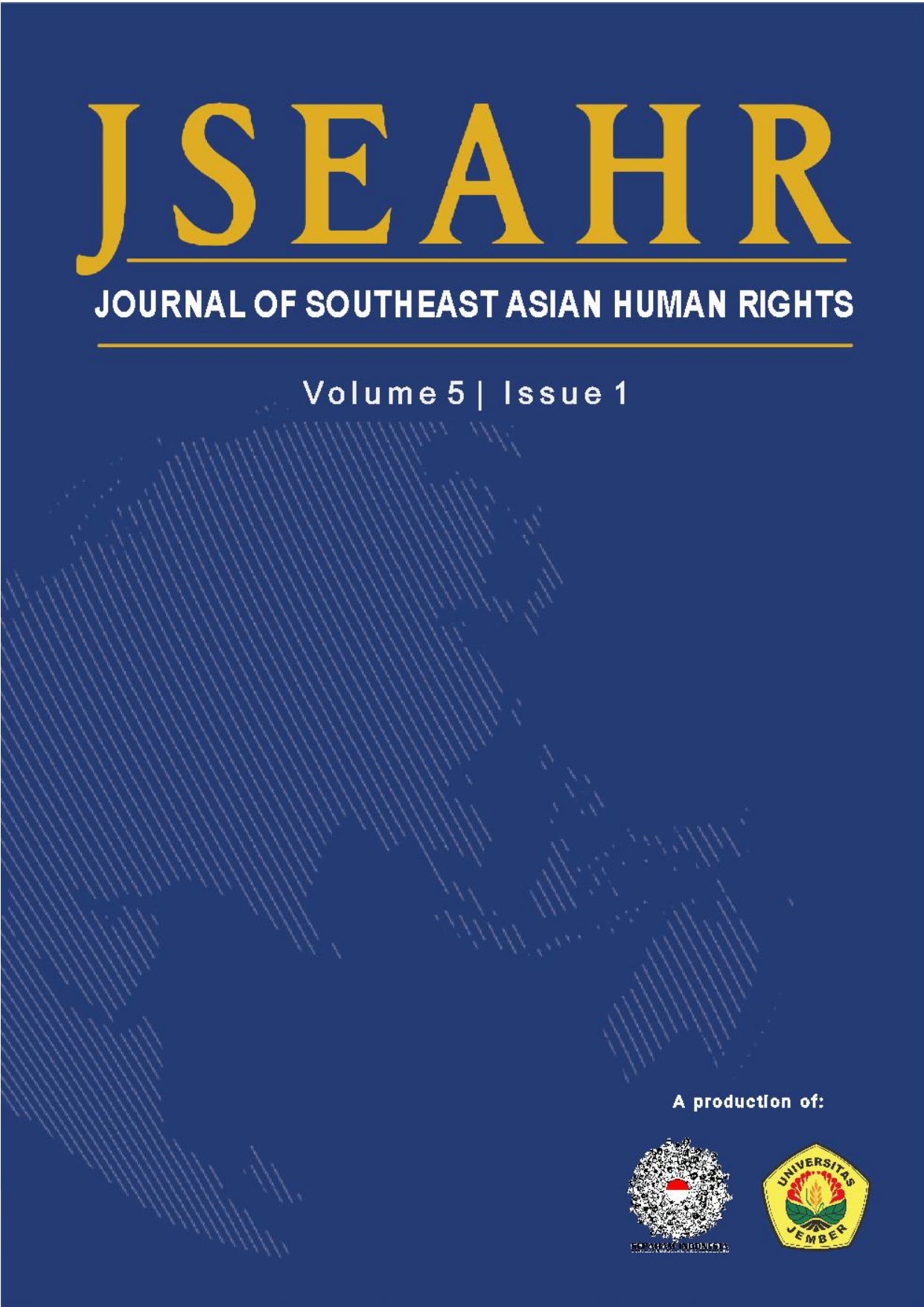Straightening History
Political Prisoners and Human Rights in Indonesia
DOI:
https://doi.org/10.19184/jseahr.v5i1.17478Keywords:
Oral History, Human Rights, 1965, Indonesia, Southeast AsiaAbstract
In the aftermath of the attempted 1965 coup, many dissidents, leftists, and suspected Communists were either ‘eradicated’ or incarcerated in prisons all over Indonesia. Since their release, these political prisoners continue to face state-enforced discrimination and stigmatisation. The marginalization of ex-political prisoners by both the state and local communities has continued through Indonesia’s democratic transition following President Suharto’s downfall in 1998. This is compounded by the presence of right-wing groups who continue to harass them, labelling them as neo-Communists inimical to the Indonesian body politic. Through direct engagement with former political prisoners, I aim to understand rehabilitative efforts through support groups. In preliminary interviews, many eks-tapol refer to the need to ‘straighten’ history. This discourse highlights their need to be recognized as ‘whole’ citizens of Indonesia. I explore the state’s struggle to address this dark chapter in Indonesian history, what it means to ‘straighten’ history and how eks-tapol engage with support groups to re-define their position within the community, denoting a strengthened sense of dignity and humanity. It is hoped that this research will contribute to efforts to understand and protect the rights of eks-tapol and other victims of political persecution in Southeast Asia.
Downloads
References
BBC News Indonesia, “Apa isi rekomendasi tim perumus Simposium Tragedi 1965?â€, (18 May 2016).
Beverley, John, Testimonio: On the Politics of Truth (U of Minnesota Press, 2004).
Conroe, Andrew Marc, “Moments of Proximity: Former Political Prisoners, Postmemory and Justice in Indonesia†(2017) 41:3 Asian Studies Review 352–370.
Dipa, Arya, “Dialita, 1965 survivors choir, to accept Gwangju human rights awardâ€, The Jakarta Post (17 May 2019).
Deutsche Welle, “Fobia 1965: Tidak Mudah Melawan Kegamanganâ€, (16 May 2016).
———, “Pemerintah Indonesia Tolak Minta Maaf Atas Pembunuhan Massal 1965â€, (18 April 2016).
Pohlman, Annie, “Reports by Human Rights and Victim Advocacy Organisations in Indonesia: Reconciling the Violence of 1965†(2013) 32:3 Journal of Current Southeast Asian Affairs 143–165.
———, “Testimonio and Telling Women’s Narratives of Genocide, Torture and Political Imprisonment in Post-Suharto Indonesia†(2008) 5:1 Life Writing 47–60.
Dragojlovic, Ana, “Materiality, Loss and Redemptive Hope in the Indonesian Leftist Diaspora†(2012) 40:117 Indonesia and the Malay World 160–174.
Farid, Hilmar, “Indonesia’s original sin: mass killings and capitalist expansion, 1965–66†(2005) 6:1 Inter-Asia Cultural Studies 3–16.
Goffman, Erving, Stigma: Notes on the Management of Spoiled Identity (Simon and Schuster, 2009).
Hefner, Robert W, Civil Islam: Muslims and Democratization in Indonesia (Princeton University Press, 2011).
Johari, Hendi, “Isu PKI Buat Jokowiâ€, Historia - Majalah Sejarah Populer Pertama di Indonesia (2019).
Kammen, Douglas & Faizah Zakaria, “Detention in Mass Violence†(2012) 44:3 Critical Asian Studies 441–466.
Kleinman, Arthur & Mamphela Ramphele, Remaking a World: Violence, Social Suffering, and Recovery, Veena Das, Margaret M. Lock & Pamela Reynolds, eds (University of California Press, 2001).
Kleinman, Arthur, Veena Das & Margaret M Lock, Social Suffering (University of California Press, 1997).
Kroef, Justus M van der, “Indonesia’s Political Prisoners†(1976) 49:4 Pacific Affairs 625–647.
Marching, Soe Tjen, The End of Silence: Accounts of the 1965 Genocide in Indonesia (Place of publication not identified: Amsterdam University Press, 2019).
Moertopo, Ali, Strategi Politik Nasional (Jakarta: Jajasan Proklamasi, Centre for Strategic and International Studies, 1974).
Roosa, John, Pretext for Mass Murder: The September 30th Movement and Suharto’s Coup d’Etat in Indonesia, 1st edition ed (Madison, Wis: University of Wisconsin Press, 2006).
Schaffer, Kay & Sidonie Smith, Human Rights and Narrated Lives: The Ethics of Recognition (Palgrave Macmillan, 2004).
Setiawan, Hersri, Kamus Gestok (Galangpress Group, 2003).
Stanley, Seputar Kedung Ombo (Lembaga Studi dan Advokasi Masyarakat, 1994).
TEMPO, Seri Tempo: Lekra dan Geger 1965 (Jakarta: Kepustakaan Populer Gramedia, 2014).
The Guardian, “Indonesian writers’ festival forced to cancel events linked to 1965 massacreâ€, (23 October 2015).
Toer, Pramoedya Ananta, The Mute’s Soliloquy: A Memoir (Hachette Books, 1999).
Turner, E, Communitas: The Anthropology of Collective Joy, 2012th edition ed (New York: Palgrave Macmillan, 2012).
Turner, Victor W, The Ritual Process: Structure and Anti-Structure (Ithaca, N.Y: Cornell University Press., 1977).
Vickers, Adrian, A History of Modern Indonesia, 2d ed (Cambridge: Cambridge University Press, 2013).
Wahyuningroem, Sri Lestari, “Towards Post-Transitional Justice†(2019) 3:1 Journal of Southeast Asian Human Rights 124–154.
Wahyuningroem, Sri Lestari, Transitional Justice from State to Civil Society: Democratization in Indonesia (Taylor & Francis Group, 2019).
Wardaya, Baskara T, “Reconciliation without politics?â€, Inside Indonesia (2015).
Wardaya, Baskara T, ed, Truth Will Out: Indonesian Accounts of the 1965 Mass Violence, translated by Jennifer Lindsay (Clayton: Monash University Publishing, 2013).







